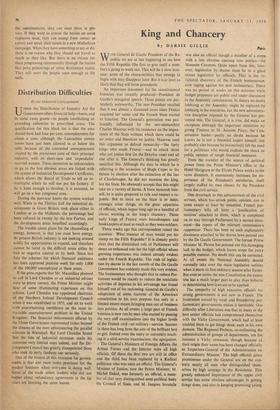Distribution Difficulties
By our Industrial Correspondent
UNDER the Distribution of Industry Act the Government offers financial help—loans, and in some cases grants—to people establishing or extending industries in prescribed areas. The qualification for this black list is that the area should have had four per cent. unemployment for about a year, although the Lancashire cotton towns have just been allowed in at below the odds because of the concealed unemployment created by the precarious state of their principal industry, with its short-time and 'expendable' married women. These incentives to industrialists to go to the less obvious areas are linked with the system of Industrial Development Certificates, which allows the Board of Trade to tell an in- dustrialist where he will not put his factory. If he is keen enough to develop, it is assumed, he will go to a less congested area.
During the post-war boom the system worked well. While in the Thirties half the industrial de- velopment in Great Britain took place either in London or in the Midlands, the percentage had been reduced to twenty by the late Forties, and the development areas benefited accordingly.
The trouble about plans for the channelling of energy, however, is that you must have energy. At present British industry is not looking around wildly for opportunities to expand, and therefore cannot be lured to the difficult areas either by bait or negative control or by both. Since last July the schemes for which financial assistance has been approved promise work for only 1,000 of the 100,000 unemployed in these areas.
If the press reports that Mr. Macmillan planned to call in Lord Chandos as an industrial adviser were to prove correct, the Prime Minister might hear of some illuminating experience on this
scheme. Lord Chandos was appointed chairman of the Northern Ireland Development Council when it was established in 1955, and set to work with overwhelming confidence on the most in- tractable unemployment problem in the United
Kingdom. The financial inducements offered by the Ulster Government represented riches beyond the dreams of the men administering the parallel schemes in Whitehall. But Lord Chandos found that the tide of industrial recession made his successes very limited ones indeed, and the De- velopment Council has greatly disappointed those who took its early fanfares too seriously.
One of the lessons of this recession for govern- ments is that one must make provision for the weaker brethren when everyone is doing well. Some of the trade union leaders who did not bother about redundancy agreements in the fat years are learning the same lesson.










































 Previous page
Previous page